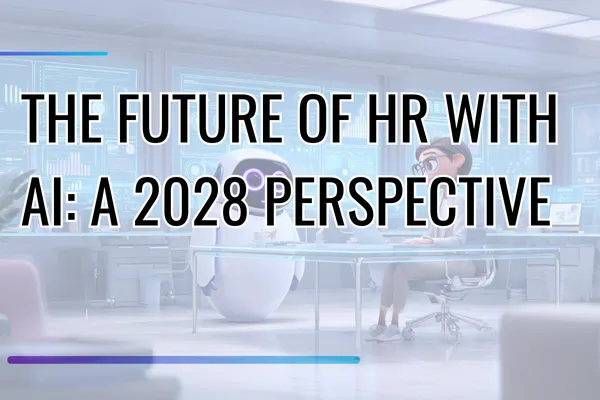
The Future of HR with AI: A 2028 Perspective
The Future of HR with AI: A 2028 Perspective
Imagine stepping into your HR office in 2028.
There are no piles of paperwork, no laborious manual data pulls. Instead, you’re welcomed by real-time talent insights on sleek dashboards, virtual coaches offering feedback tips to managers, and AI “agents” forecasting your next hiring campaign success and advising you on suggested organisational development changes.
This is not science fiction, but the emerging reality of Human Resources.
“By 2028, HR will have evolved from a back-office cost centre into a strategic powerhouse, blending human empathy with generative and agentive AI to deliver agile, personalised people experiences.”
1. Strategic Workforce Planning & People Analytics
“What-if” Talent Roadmaps:
Agentive AI analyses your organisation’s performance metrics, market hiring trends, and skills-gap data to generate dynamic hiring plans. Adjust a slider for “remote hires” and instantly see the impact on engagement and cost.Real-Time Workforce Health:
Interactive dashboards monitor attrition risk and emerging skills shortages, sending predictive alerts when action is needed—so you’re never blindsided by sudden turnover spikes.
“In 2028, HR isn’t reactive. Thanks to AI, it’s now much easier and faster to be predictive. Something we have been wanting for decades.”
2. Talent Acquisition & Onboarding
AI-Powered Sourcing Bots:
Sophisticated bots scour professional networks and job boards 24/7, pre-screening candidates via natural-language interviews and ranking them by both cultural fit and technical skills.Personalised Onboarding Journeys:
Generative AI crafts custom learning pathways, auto-schedules compliance checks, assigns mentors, and even sends welcome videos tailored to each new hire’s role and background.
“First impressions start before day one and they can be designed by AI.”
3. Learning, Development & Reskilling
Dynamic Learning Content:
Generative AI produces everything from video scripts to micro-quizzes and immersive simulations, keeping pace with rapidly evolving skills.Continuous Skill Currency:
AI recommends stretch assignments and next-step courses based on performance data and career aspirations, ensuring every employee’s growth path is unique.
Learning isn’t a one-off event. It’s a living, breathing journey that can be adapted quickly.
4. Employee Experience & Engagement
Smart Pulse Surveys:
Generative AI crafts emotionally intelligent survey questions; agentive systems surface urgent themes—such as emerging burnout hotspots—for immediate action.AI-Guided Coaching:
Chatbots coach managers on delivering feedback with empathy, flagging early signs of disengagement and suggesting personalised interventions.
Engagement is more than numbers. It’s about real conversations that can be amplified, not replaced, by AI.
5. Performance Management & Reward
Continuous Feedback Loops:
Annual reviews give way to AI-assisted, real-time feedback that captures both objective outcomes and soft-skill development.Bias-Guarded Reward Frameworks:
AI models ensure equitable recognition and guard against unconscious bias, while your ethics team audits for fairness.
Performance isn’t a once-a-year checkbox. It’s an ongoing dialogue.
6. Ethics, Compliance & AI Governance
AI Oversight:
Ethics and compliance officers maintain end-to-end oversight of all AI tools—approving new agentic modules, monitoring bias metrics, and enforcing GDPR-level data privacy.Responsible AI Policies:
AI use policies are co-designed with line managers, balancing innovation with employee trust at every step.
Trust in AI begins with transparent governance.
7. Administrative Automation & Vendor Management
Exception-Based Workflows:
Payroll, benefits, and policy updates run on AI workflows, with human intervention reserved for exceptions.Strategic Vendor Partnerships:
HR leads negotiate AI-platform contracts, orchestrate seamless integrations, and ensure SLA adherence for uptime and security.
The HR Team of 2028: New Roles, New Focus
Role
Core Focus
HR Business Partner
Strategic advisory & change management
People Data Analyst & AI Lead
Designing, validating & fine-tuning HR AI models
Learning Experience Designer
Curating generative-AI curricula & mentorship
Ethics & Compliance Officer
Ensuring responsible AI use & data privacy
Employee Well-being Lead
Championing mental health & inclusive culture
By 2028, 60–70% of transactional HR tasks will be automated. Your calendar will be dominated by:
Strategic planning workshops and AI-model reviews
Cross-functional “people innovation” sprints
Culture-building events and well-being clinics
Vendor governance meetings and compliance audits
From administrative cost-centre to strategic powerhouse, the in-house HR function will deliver agile, personalised, and ethical people solutions—powered by AI, driven by human insight.
Your Next Step
How ready is your team to embrace this future? What’s one HR process you’d love to see AI automate tomorrow?
Share your thoughts below, or reach out to explore how our AI HR Accelerator Coaching Programme can fast-track your journey to 2028-ready HR.
Selected References:
Deloitte, 2024 Global Human Capital Trends
McKinsey, The State of AI in 2024
World Economic Forum, Future of Jobs Report 2023
CIPD, People Profession 2030: A Collective View of Future Trends
Gartner, HR Technology Trends 2024
PwC, Workforce of the Future: The Competing Forces Shaping 2030
LinkedIn, Workplace Learning Report 2024
IBM, The Enterprise Guide to Closing the Skills Gap
Gallup, State of the Global Workplace 2024
Harvard Business Review, How AI is Transforming Employee Experience
Bersin by Deloitte, The Rise of Continuous Performance Management
CIPD, AI and Ethics in HR
European Commission, Ethics Guidelines for Trustworthy AI
Accenture, Responsible AI: From Principles to Practice
KPMG, The Future of HR: From Flux to Flow
Forrester, The Forrester Wave™: Human Capital Management, Q2 2024
All statistics and quotes are drawn from leading industry reports and research as cited above.

